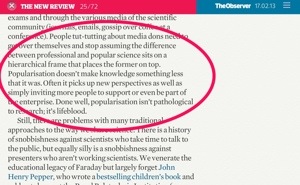making things easy to follow is underestimated
 Catching up on a week's worth of paper's this morning, this piece on the way TV does science caught my eye. Specifically, the section circled in pink, since it's not only true of science. It's very much the same in Classics and History, and I don't think I'm the only person I know to have been turned off academia because of it.
Catching up on a week's worth of paper's this morning, this piece on the way TV does science caught my eye. Specifically, the section circled in pink, since it's not only true of science. It's very much the same in Classics and History, and I don't think I'm the only person I know to have been turned off academia because of it.
See, the hierarchy doesn't just apply to 'professional' vs. 'popular' - it applies to 'research' vs 'teaching' in a lot of arts subjects. Which is odd, since, universities are about about educating people. And yet, universities are still (largely) rated based on research output, and academics are (largely) more inclined towards research than to teaching. That makes sense in a lot of ways - given that postgraduate education - in the UK (less so in the states) is about research. But universities have more and more people to teach, and more and more demand upon them to provide more contact hours - and so it doesn't make sense any more to value research above teaching in some warped hierarchy. After all, if you can't teach the research, what's the research for?
But the snottiness about research over teaching exists - probably more in the atmosphere than in individual attitudes. It's a groupthink thing. And then it seeps out into a 'professional' vs 'popular' feud, which is about money, and audience, and a sense that the people who are doing 'popular' work aren't at the cutting edge of research any more, so they don't deserve their success. Get a room full of Classicists together and ask them about Mary Beard, or Historians and ask them about Schama or Ferguson. I guarantee you'll get at least a small haze of negativity.
So, I'll freely admit that it's got to be hard to maintain sustained, in-depth research and a media profile. Time and concentration are probably against most people. But to get on your high-horse about that, and be rude about other academics for being 'popular' (which is so often set against being 'good' in this discourse) is just silly.
For a start - new research, especially really cutting edge stuff, can just be really hard to explain because a part of the research is about working out the language for talking about it. It does take time and a communications journey to get from whizz-bang theory / interpretation of history to any public forum, let alone a broad popular forum. A lot of the time it takes a whole lot longer than it ought (I'm pretty sure there are still people out their teaching defensive imperialism as part of the history of the Roman Republic, which, just, *HEADDESK*).
Secondly, people have different talents and skills. I think we're all aware of that? And research and teaching, and communicating to a popular audience beyond a classroom, takes different bundles of skills. It's rare for anyone to excel in them all (and probably rarer for someone to be able to exercise them all at the same time - see above, re. time, limited). Some people are great at teaching and communicating but produce research that is anything from dull to barely-above-average. Some of the people doing the best research are bad at sharing their work - several write pretty atrociously and should not be allowed to speak in public unless they have an audience of insomniacs. The majority of academics exist in a state of balance - but also tension, both wanting to produce the next great piece of research and be acclaimed by their peers, and to produce something that gains them public attention (and, maybe, a pay bump). That's stating it baldly, but I think that the tension does exist.
But regardless which group an academic exists in, chances are they fall prey at some point to that very human jealously of another's success (be it in research on in popular press), and then they say things, and then an atmosphere is created, and it all ends up being just a bit unpleasant. And so we end up with an anti-intellectual trope in some parts of society, and an anti-populist one in others. And I just want to hit people on both sides with a wet fish.
But right now I'm thinking about the snotty perception of 'media dons' by academics, and how darn stupid it is, and how academics, especially in arts subjects that are under attach for being 'economically unsound' need communicators and ambassadors to show why they're worthwhile, and why the research being done in universities matters. You can quibble with the content or the line of argument, or the kind of thing that gets attention, but following that up with an implication that it's all worthless because it's popular helps nobody. All of that can be improved if you just engage with it. But every time someone is snarky and dismissive about a TV historian for being 'popular' they're jut shooting themselves in the foot: they make themselves look like unpleasant dinosaurs and then throw away the chance to participate in the kind of history that the general public hears.